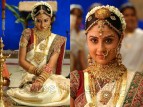 1. Hindu Wedding
1. Hindu Wedding
There are a number of ceremonies in Hindu wedding prior and post wedding. The functions start a week before the marriage, which includes the haldi, sangeet and mehendi ceremony. The Haldi ceremony relates to applying the paste of tumeric and sandle wood on both, the bride and the groom. Music is the soul of every wedding celebration and so the sangeet function is abound with enthusiastic dancing and singing. It is exclusively for women. As far as mehendi goes, women choose their choice of mehendi and have it applied on their hands. Interestingly, the application of bridal mehndi is associated with several things. For instance, the darker the colour of the bride’s mehndi, it's said the more her partner will love her, etc.
On the day of the wedding, the groom arrives at the venue accompanied with his family and friends. The bride's family welcomes the Baraatis (groom's family) with flowers and lavish meals. For the Saat Phere (seven vows) the couple takes an oath to be together in times of trouble, loving and respecting each other, etc. Post wedding, Vidaai is the most emotional ceremony that marks the end of the marriage celebration. This is when the bride seeks leave from her parents, family and friends and goes to her husband's home to start a new life with new dreams and hopes. Finally, after the bride arrives at her new home, the Griha Pravesh is done to welcome her home.
2. Muslim Wedding
In Muslim weddings, the term marriage is called Nikah and is celebrated with grandeur. Muslims do not believe in auspicious planetary positions and so, Muslim weddings can take place at any time of the year. The mehendi and sangeet ceremony is celebrated in the same manner like it is in Hindu marriages. Nikaah is performed by the Maulvi or the family priest and is attended by all the family members of the bride and the groom. Throughout the wedding men and women are seated separately. The Walids (bride's father and groom's father) play an important role in all the rituals. The Maulvi reads out important verses from the Quran and performs the wedding rituals. 'Ijab-e-Qubul' or acceptance of the proposal is done by both, the bride's and groom's families. After this ceremony the couple is considered legally married.
Once this is done, the mehar and nikaahnaama takes place, where the groom's family gives mehar (money) to the bride as a financial security. Then the nikaahnaama is signed by the bride, the groom, their parents and the Maulvi. Nikaahnaama is a legal contract that contains a set of terms and conditions that must be followed by the bride and the groom. The wedding is then followed by a reception ceremony.
3. Christian Wedding
Christians have one similar ceremony before marriage – haldi. The Christian wedding takes place in the church and is officiated normally by the priest. Traditionally, the bride’s father walks down with the girl towards the altar, while the bridegroom waits there. The priest asks the bride and the groom, “Do you take him/her as your lawful wife/husband, to have and to hold, from this day forward, for better or for worse, for richer or for poorer, in sickness and in health, to love and cherish until death do you part?" and once they answer, “I do” the couple sign a marriage contract and then the ceremony is complete. The bridegroom is escorted by his best man, while the bride has her maid of honor throughout this ceremony. The wedding is then followed by a reception in the evening where the couple cuts the wedding cake.
![]() Live Help |
Live Help |
![]() Membership Options |
Membership Options |
![]() Success Stories |
Success Stories |
![]() Create Profile
Create Profile